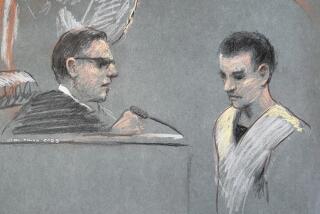Weinberger Tightens Security to Curb Spying
- Share via
WASHINGTON — Defense Secretary Caspar W. Weinberger ordered new security curbs Tuesday on up to 60,000 military and civilian employees with access to secret codes and cryptographic equipment, including workers at the National Security Agency, where accused Soviet spy Ronald W. Pelton had a top-secret clearance.
The restrictions, proposed last week in a Pentagon report on military security, were the first public countermeasures to a rash of spying arrests involving intelligence and military employees.
Pentagon officials admitted Tuesday that Pelton caused “serious” damage during nearly six years of spying that began after he resigned from the NSA in 1979 and ended with his arrest in Annapolis, Md., Monday morning.
In a second case, a federal indictment charged Tuesday that Larry Wu-tai Chin, a retired CIA worker still under contract to the agency, became the Chinese intelligence agency’s deputy bureau chief for Washington spying operations during a 33-year espionage career for the People’s Republic of China.
Chin, Pelton and an accused husband-and-wife espionage team--Jonathan J. Pollard and Anne L. Henderson-Pollard--were to appear at bond hearings today in federal courts in Washington, Baltimore and Alexandria, Va. The Pollards were arrested Thursday and Saturday on charges of spying for an unnamed foreign power, reported to be Israel.
Stronger Measures Urged
Weinberger’s order for restrictions on cryptographic material follows calls by Reagan Administration and congressional officials for stronger counterintelligence measures to combat a wave of foreign espionage in the United States.
In a report requested by the Senate Intelligence Committee, Pentagon experts recommended last week that the government adopt tight controls over access by Pentagon employees to codes and coding equipment. Similar controls were dropped in 1975 because they were regarded as too burdensome to maintain over the hundreds of thousands of Defense Department workers with access to secret cryptographic materials.
Defense Department spokesman Robert B. Sims said Tuesday that the new security measures would be “narrowly focused” on 50,000 to 60,000 workers with access to the most sensitive data and equipment. He said that many probably work at the NSA, the super-secret agency responsible for sending and receiving coded military data and intercepting and decoding foreign communications.
Sims said the restrictions will involve briefings to “sensitize” employees to spying dangers, new limits on access to codes and equipment and possibly regular lie-detector tests for some workers.
‘Sensitive’ Data
Neither Pentagon officials nor other experts have been willing to detail the actual damage to U.S. security by the spying revealed during the last week, but most experts say that NSA secrets potentially disclosed in the Pelton case are most worrisome. Affidavits filed Monday by the FBI contend that Pelton disclosed “sensitive” information about codes and about an unnamed U.S. espionage program directed at the Soviet Union.
Codes are among the most valuable espionage finds because they are keys to deciphering vast amounts of secret data that otherwise would be useless. Several current and former intelligence officials said Tuesday that the impact of the NSA disclosures could range from minor to devastating, depending on how much access Pelton enjoyed, whether he smuggled documents out of the agency and whether he led the Soviets to other NSA workers who could be enticed into spying.
Officials have declined to assess the damage in the Pollard or Chin cases. Pollard, a civilian worker at the Naval Investigative Service, was involved in counterterrorism work.
First Hired in 1952
The Chin indictment alleges that he passed secrets to the Chinese as early as 1952, when he was first hired by the CIA’s Foreign Broadcast Information Service to monitor foreign broadcasts and publications. After retiring in 1981, he continued to spy for the Chinese until this month as a contractor to the CIA’s Joint Publications Research Service, the intelligence agency’s language-translation arm.
The indictment contended that Chin met at least 15 times with Chinese contacts during those 33 years, usually in Hong Kong or Toronto. But he also traveled in 1982 to the Chinese capital of Peking, where he was promoted to deputy bureau chief, and again to the Chinese mainland in February and March of this year.
The indictment alleged that Chin stole secret documents from the agency’s Rosslyn, Va., offices for copying from 1976 to 1981 and contended that he told his handlers in 1983 of another employee of the information service whom he “believed to be susceptible” to being recruited as a spy for China.
More to Read
Sign up for Essential California
The most important California stories and recommendations in your inbox every morning.
You may occasionally receive promotional content from the Los Angeles Times.













